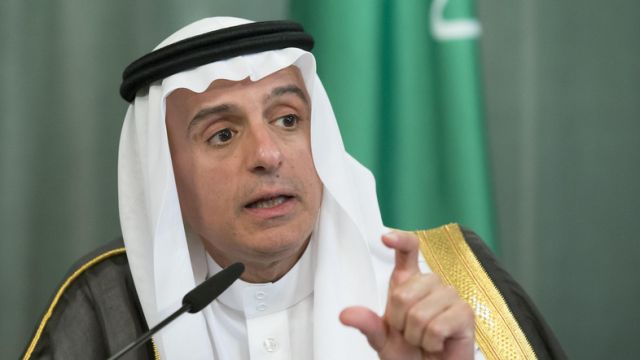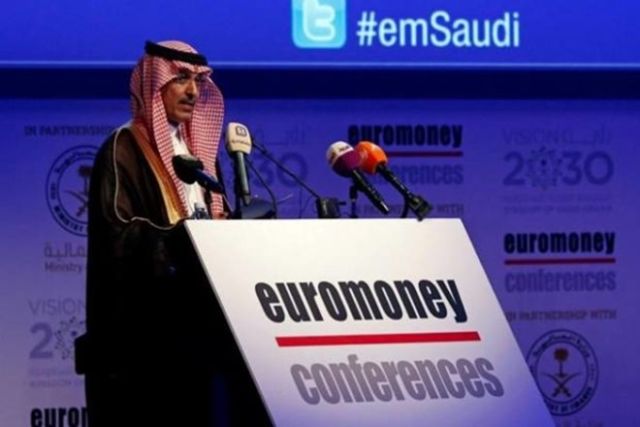
by admin | May 25, 2021 | Muslim World

Saudi Arabian Foreign Minister Adel bin Ahmed al-Jubeir
Riyadh : Saudi Arabian Foreign Minister Adel bin Ahmed al-Jubeir said that the country has zero tolerance towards corruption and extremism and dismissed speculation that the shock arrests of princes and ministers amounted to a grab of power by Crown Prince Mohammed bin Salman, the media reported.
Saudi Arabia has a “zero tolerance policy on terrorism” and now, also “a zero tolerance policy on corruption,” al-Jubeir told CNN in an interview on Monday night.
“I assure you that the Kingdom of Saudi Arabia takes very, very seriously the issue of corruption, waste, and mismanagement.
“There is a reason why everybody was brought in or detained and will be questioned and will be investigated and these have to do with the commission. I’m sure when the investigations are complete that people will know what the reasons are.”
Al-Jubeir said the arrests made on November 4 were in line with Saudi Arabia’s plans to diversify the economy and modernise society by 2030 and achieve economic growth, rejecting suggestions that the detentions could put off potential investors.
“We want investors to have confidence in our system… We want companies to know that when they come to compete in Saudi Arabia they will compete fair and square with any other company and not be subject to people using their influence or their position in order to extract better deals.”
The arrests were made following the formation of an anti-corruption committee headed by the Crown Prince.
The detainees include 11 Saudi princes and several other ministers.
In regard to the failed ballistic missile attack on Riyadh’s international airport also on November 4, al-Jubeir told CNN that it was as an “act of war by Iran” and will “respond in the appropriate manner at the appropriate time”.
Yemen’s Houthi rebels have claimed responsibility for firing the projectile which was intercepted by Saudi defence forces before it hit the ground.
“It was an Iranian missile, launched by Hezbollah, from territory occupied by the Houthis in Yemen.
“We see this as an act of war… Iran cannot lob missiles at Saudi cities and towns and expect us not to take steps,” he told CNN.
“This is a very, very hostile act… We have been extending our hand to Iran since 1979 in friendship, and what we get back is death and destruction.”
On Monday, Saudi Arabia closed its ports and borders with Yemen to stop Iranian penetration into the country.
He insisted however that humanitarian aid would still make it through to the millions of people suffering from malnutrition and cholera brought on by the years-long war between the Houthi rebels and Saudi Arabia.
“Our objective is to increase the flow of humanitarian assistance in Yemen, but do it in such a way that Iran and its militias and its proxies cannot use that access in order to smuggle weapons and technology that can be re-assembled into missiles in Yemen, that will then be used against us and against the Yemeni people,” the minister added.
—IANS

by admin | May 25, 2021 | Muslim World
 Riyadh : Saudi Arabia on Monday accused Iran of supplying ballistic missiles to the Houthi rebels in Yemen and called it a blatant act of military aggression.
Riyadh : Saudi Arabia on Monday accused Iran of supplying ballistic missiles to the Houthi rebels in Yemen and called it a blatant act of military aggression.
In a statement, the command of Saudi Arabia-led coalition forces in Yemen, said that an analysis of the remains of the missiles that were launched on Saturday against Riyadh confirmed they were made in Iran, reports Efe news.
“The coalition command considers this a blatant act of military aggression by the Iranian regime and could be considered an act of war against the kingdom of Saudi Arabia.”
The spokesperson for the Arab coalition Turki Almalik, had claimed on Sunday that the ballistic missile attack against Riyadh was manufactured in Iran.
The statement stressed it is Saudi Arabia’s legitimate right to defend its territory and people according to the UN charter and to respond to Iran at an appropriate time and manner.
Following the missile attack by the rebels, the coalition forces also decided to temporarily shut down all land, air and sea ports in Yemen.
On Saturday, the Houthi rebels had launched a ballistic missile against Riyadh that was intercepted near the Saudi capital by the armed forces.
The rebel-controlled Yemeni news agency SABA had said the missile was targeted at King Khalid International Airport in Riyadh.
The Shiia Houthi rebels, backed by Iran, frequently fire shells at the Saudi Arabian border near the frontier, and on several occasions, have launched ballistic missiles that fell close to Riyadh.
Saudi Arabia leads the coalition of Sunni Arab countries that have been intervening in the Yemen conflict since March 2015 in support of Yemeni President Abdrabbuh Mansour Hadi.
—IANS

by admin | May 25, 2021 | Muslim World

Saudi Finance Minister Mohammed al-Jadaan
Riyadh : Saudi Finance Minister Mohammed al-Jadaan has said that strict steps against corruption will maintain the investment environment and enhance trust in implementing the order, a media report said.
His statements come after eleven princes, four sitting ministers and dozens of former ministers were arrested on orders from the new anti-corruption committee headed by Crown Prince Mohammed bin Salman on Saturday, Xinhua news agency quoted Al Arabiya local press as reporting on Sunday.
He said the arrest reinforces justice and transparency and protects the rights of individuals and public money.
“Fighting corruption will promote the trusts of businessmen and just competition between investors.”
—IANS

by admin | May 25, 2021 | Muslim World

Saudi Arabia’s Crown Prince Muhammad bin Salman
Riyadh : The recent statements by Saudi Arabia’s Crown Prince Muhammad bin Salman, deputy premier and minister of defense, have sent oil prices to over $60, the highest in more than two years, agencies said.
The Crown Prince’s statements have cleared the fogginess shrouding the markets, hence restoring confidence. The restoration of a balance in the oil market has raised the status of the Kingdom’s leadership, proving its success despite the challenges. During the recently held investment conference here, the Crown Prince confirmed that the demand for petroleum is set to increase. Crown Prince Muhammad also provided reassurance on the future of energy, both conventional and renewables. In a statement to Reuters, he said the Kingdom was committed to working with all OPEC and non-OPEC countries.
He said that they have achieved a great and historic agreement and the Kingdom would support all that would realize stability of supply and demand. He stressed that they have restored control over all matters. He confirmed the Kingdom’s readiness to extend the deal on cutting oil production, which has restored balance between supply and demand. The Crown Prince added that the high demand for oil has offset the high production of shale oil. Comments made by the Crown Prince have sent Brent crude to its highest in two years ($59.3 a barrel), Reuters said.
Crown Prince Muhammad reassured that the Aramco initial public offering is still on track for its scheduled takeoff in the second half of 2018. Minister of Energy, Industry and Mineral Resources Khalid Al-Falih said earlier this week that “When we get closer to that (five-year average) we will decide how we smoothly exit the current arrangement, maybe go to a different arrangement to keep supply and demand closely balanced so we don’t have a return to higher inventories.” These comments suggest that the lower production could become something of a norm as long as everyone in OPEC and its external partners agrees.
THE $500 billion mega-city, called ‘NEOM’ planned by Saudi Arabia will be floated on financial markets alongside oil giant Saudi Aramco as part of the Kingdom’s drive to diversify away from oil, the Crown Prince told Reuters in an interview on Wednesday. The Crown Prince also said Aramco’s initial public offering is on track for next year and the national oil giant could be valued at more than $2 trillion.
The surprise announcement about the listing of NEOM, a 26,500-sq. km zone that will extend into Jordan and Egypt, is the latest and most extraordinary in a slate of privatization programs led by the floating of Aramco. The futuristic high tech hub looks set to become a flagship of reforms championed by Prince Muhammad to create jobs, encourage entrepreneurs and permit new freedoms among Saudis steeped in puritanism and dependence on the state.
“The first capitalist city in the world … this is the unique thing that will be revolutionary,” said Prince Muhammad, heir to the throne of the largest Arab economy. The Crown Prince spoke on the sidelines of the Future Investment Initiative conference, which ended on Thursday, has attracted nearly 4,000 delegates from around the world to Riyadh this week.
—IINA/HA/OIC-UNA

by admin | May 25, 2021 | Muslim World
 Riyadh : Saudi Arabia’s Ministry of Environment, Water and Agriculture, the National Center for Palms and Dates, and the Saudi Technology Development and Investment Company (TAQNIA), studied plans to establish the biggest regional factory to benefit from palm, date and agriculture waste.
Riyadh : Saudi Arabia’s Ministry of Environment, Water and Agriculture, the National Center for Palms and Dates, and the Saudi Technology Development and Investment Company (TAQNIA), studied plans to establish the biggest regional factory to benefit from palm, date and agriculture waste.
This came during a meeting presided over by Ahmed bin Saleh Ayada, undersecretary for the ministry; Sulaiman Al-Khateeb, chairman of vegetable resources at the ministry; and Mohammed Al-Nueiran, president of the center, to study the establishment of the first regional factory to turn waste from palms and dates into products of economic value. According to Nueiran, it is planned to establish the factory near the Qassim region, the second largest main region producing palm and date waste in the Kingdom.
The factory’s productive capacity is estimated at 300,000 tons per year of the transformed products that require 500,000 tons of palms, dates and agriculture product waste. He said that based on the study, the project is expected to create 2,000 direct and indirect new job opportunities across other production regions in Riyadh, Madinah, Al-Ahsa and other cities. The agriculture sector in the Kingdom produces over 1.7 million tons per year of palm, date and agricultural waste.
—IINA/HA/OIC-UNA





